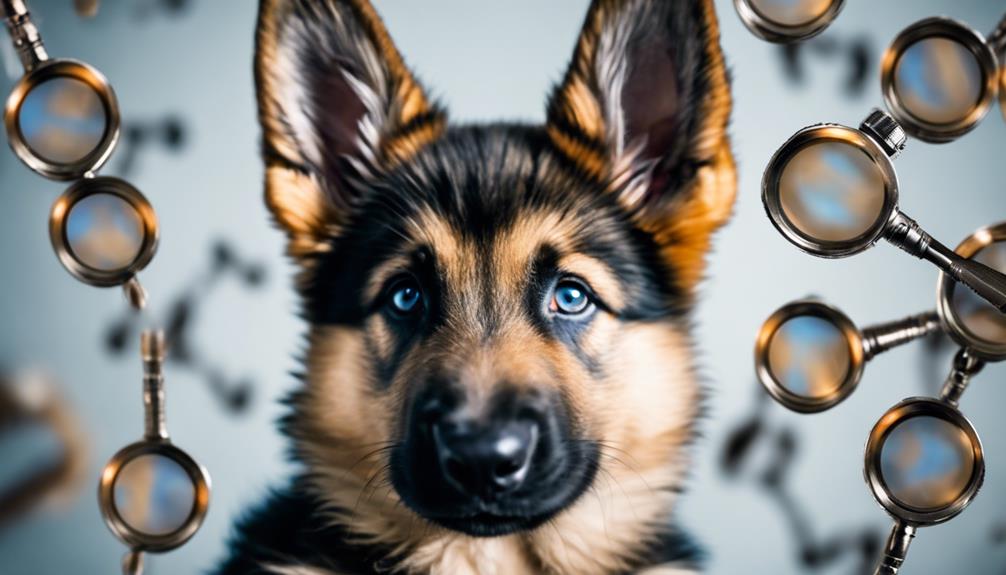🐾 Paw-some Partnership Alert! 🐾
As a pack of German Shepherd enthusiasts at MixGermanShepherd.com, we're always sniffing out the best products for our furry friends. Guess what? When you fetch something from Amazon through our links, we earn a little treat! 🦴
When you look at your German Shepherd mix puppy, you see a bundle of energy and curiosity. But have you ever wondered why your furry companion acts the way they do or why they look a certain way? Understanding the genetics behind your German Shepherd mix puppy's traits can unravel a fascinating story about their origins and potential future developments. By exploring the intricate world of genetics, you can gain valuable insights into your puppy's unique characteristics and health considerations.
Key Takeaways
- Genetic testing reveals specific traits and health risks in German Shepherd mix puppies.
- Understanding genetic influences aids in predicting behavior and appearance traits.
- Tailoring care based on genetic makeup enhances long-term health and well-being.
- Genes shape physical characteristics, coat traits, and unique qualities in your puppy.
Genetic Influences on Behavior

Genetic influences on behavior in German Shepherd mix puppies play a significant role in shaping their temperament and personality traits. DNA testing and selective breeding practices are crucial factors that contribute to the development of behavior traits in these puppies. Through genetic mapping studies, associations on various canine autosomes have been identified, shedding light on the heritability of behavior traits in German Shepherds. By understanding these genetic influences, you can better predict and manage your puppy's behavior, particularly traits like playfulness and fear.
Selective breeding practices also impact the behavioral tendencies of German Shepherd mix puppies. Ensuring genetic diversity in breeding programs can help maintain a healthy population with a range of desirable behavior traits. By considering the genetic influences on behavior, you can make informed decisions when selecting a German Shepherd mix puppy that aligns with your lifestyle and preferences. DNA testing and responsible breeding practices are essential tools in promoting positive behavior traits in these intelligent and loyal companions.
Traits Passed Down From Parents

Traits passed down from your German Shepherd mix puppy's parents play a crucial role in shaping its physical characteristics and behavioral tendencies. Genes inherited from both parents determine aspects like coat color, pattern, and texture, as well as certain behavioral traits. Understanding the genetic makeup of the parents can provide valuable insights into the potential traits your puppy may exhibit.
Inherited Physical Characteristics
Consistently inherited physical characteristics in your German Shepherd mix puppy reflect the genetic blend passed down from its parents, shaping traits like coat color, pattern, and texture. Genetic factors play a crucial role in determining these traits, with variations in genes influencing the coat's appearance. The coat color of your puppy can vary depending on the specific genes inherited from its German Shepherd and other breed parents. Understanding these genetic components can also provide insights into potential health risks associated with certain coat types. By recognizing these inherited characteristics, you can anticipate grooming needs, potential allergies, and other health considerations specific to your German Shepherd mix puppy. Genetic testing can offer further information on the specific traits and health risks present in your beloved pet.
Behavioral Tendencies Inherited
As your German Shepherd mix puppy grows, you may notice certain behavioral tendencies that mirror those exhibited by its parents, reflecting the inherited traits that shape its unique personality. These behavioral tendencies are influenced by genes passed down from the puppy's parents, affecting traits like playfulness, fearfulness, sociability, and chasing behavior. Understanding the genetic influences behind these behaviors can help you anticipate and address specific tendencies in your mixed-breed puppy. Genetic mapping studies have identified specific genes and regions associated with various behavior traits in dogs, providing valuable insights into your puppy's predispositions. By utilizing genetic testing and knowledge of inherited behaviors, you can tailor training and socialization efforts to better suit your German Shepherd mix puppy's needs.
Understanding Genetic Diversity

When considering your German Shepherd mix puppy's genetic diversity, focus on the variations that contribute to their unique traits and potential health risks. Understanding how different genes interact in your puppy can help you anticipate any inherited conditions they may be predisposed to. Breeding for diversity in mixed-breed dogs can potentially mitigate the risk of genetic disorders often prevalent in purebred lines.
Genetic Variations in Dogs
Dogs display a remarkable genetic diversity characterized by approximately 19,000 protein-coding genes and 39 pairs of chromosomes. This genetic variation manifests in various ways, including allele series that influence coat color and other phenotypic traits. To understand the complexity of genetic variations in dogs, consider the following table:
| Genetic Variation | Description | Example |
|---|---|---|
| Allele Series | Multiple forms of a gene affecting a trait | Different coat colors in dogs |
| Coat Color | Controlled by multiple genes and modifiers | German Shepherds' black and tan coats |
| Mutations | Changes in DNA sequence leading to variations | Missense mutations causing disorders |
| Regulatory Genes | Control gene expression and protein production | Influence on overall phenotype |
These factors contribute to the diverse characteristics observed in dogs, including your German Shepherd mix puppy.
Inherited Health Risks
In considering the genetic diversity of your German Shepherd mix puppy, it is important to be aware of potential inherited health risks such as hip dysplasia and degenerative myelopathy. German Shepherd mix puppies can inherit these conditions due to their genetic background. Genetic diversity plays a crucial role in reducing the risk of inherited disorders from purebred lines. To better understand and predict potential health issues in your mixed-breed puppy, genetic testing and health screenings are valuable tools. Responsible breeding practices focus on enhancing genetic diversity to minimize the prevalence of inherited diseases in German Shepherd mix puppies. By being informed about inherited health risks and advocating for responsible breeding practices, you can help ensure the well-being of your furry companion.
Breeding for Diversity
How does genetic diversity impact the health and well-being of German Shepherd mix puppies? Breeding practices that prioritize genetic diversity in German Shepherd mixes can significantly reduce the risk of inherited health issues and genetic disorders. By mixing different breeds, new genetic variations are introduced, leading to a broader gene pool that can help mitigate breed-specific health problems. Understanding the genetic backgrounds of the parent breeds is crucial in promoting diversity in mixed breed puppies. Genetic diversity plays a vital role in enhancing the overall health and vitality of German Shepherd mix puppies by lowering the impact of inherited diseases. Therefore, selecting for diversity in breeding practices can contribute to the long-term well-being of these mixed breed dogs.
Impact of Genetic Mutations

Genetic mutations play a critical role in shaping the DNA sequences of your German Shepherd mix puppy, potentially leading to inherited disorders and health complications. Understanding the impact of genetic mutations is crucial for assessing the health risks your puppy may face. Here are some key points to consider:
- Genetic mutations can lead to alterations in DNA sequences, affecting gene function.
- Some mutations may be harmless, while others can result in genetic diseases in dogs.
- Mutations can be spontaneous or induced by external factors like radiation or chemicals.
- Genetic testing can help identify mutations, guiding breeders in making informed decisions to prevent passing on harmful genetic variations.
Heritability in Mix Breeds

When considering the heritability of traits in mixed breed puppies, it's important to recognize the impact of genetic diversity from each parent breed. Inherited traits in mixed breed dogs can exhibit a range of patterns influenced by the genetic contributions of the parent breeds. Understanding the genetic background and potential heritability of traits can offer valuable insights into the characteristics of your German Shepherd mix puppy.
Mix Breed Genetics
Understanding the heritability of traits in mixed breed dogs is essential for predicting the genetic makeup of your German Shepherd mix puppy. When considering mix breed genetics, keep in mind that:
- Heritability in mixed breed dogs varies based on genetic contributions from each parent.
- Traits like coat color, size, and temperament in mixed breed puppies are influenced by both parents' genetic backgrounds.
- Mixed breed dogs inherit a combination of traits from different breeds, impacting their overall genetic makeup.
- Genetic diversity in mixed breed puppies can lead to unique characteristics not typically seen in purebred dogs.
Inherited Traits
With a mix breed puppy like your German Shepherd mix, the inheritance of traits becomes a fascinating interplay of genetic contributions from both parent breeds. Heritability estimates in mixed breed dogs can vary due to their diverse genetic backgrounds. Inherited traits in mixed breed puppies may showcase a blend of characteristics from different breeds, making each pup unique. Understanding the heritability of specific traits in mixed breed puppies can help predict their behavior and appearance. Genetic contributions from both parent breeds significantly influence the heritability of traits in mixed breed dogs. Assessing heritability in mixed breed puppies involves considering the genetic diversity and inheritance patterns from their parental breeds.
| Trait | Heritability Estimates |
|---|---|
| Size | Moderate |
| Coat Color | High |
| Temperament | Low |
| Energy Level | Moderate |
Genetic Diversity
Genetic diversity in mixed breed dogs, such as your German Shepherd mix, plays a pivotal role in shaping their inherited traits and behavioral characteristics. When considering your puppy's behavior traits, understanding the impact of genetic diversity is crucial. Here are some key points to help you grasp the significance of genetic diversity in your German Shepherd mix:
- Heritability estimates for behavior traits in German Shepherd mix breeds can vary significantly.
- Genetic control can influence traits like Human-directed playfulness and Non-social fear.
- The genetic background of your German Shepherd mix puppy can provide insights into their behavior tendencies.
- Breed-specific genetic influences can impact the behavior traits of German Shepherd mix puppies, highlighting the importance of genetic diversity.
Gene Expression in Puppies

During the early developmental stages of a puppy, gene expression plays a crucial role in determining how genetic information is translated into proteins and physical traits. In the case of German Shepherd mix puppies, gene expression influences their physical characteristics, such as coat color, size, and predisposition to certain health conditions. Puppies inherit genetic material from their parents, and the way these genes are expressed can vary widely among individuals, contributing to the uniqueness of each puppy. Environmental factors also interact with gene expression, further shaping a puppy's development and traits.
Genetic testing can be a valuable tool in understanding the gene expression patterns of mixed breed puppies. By analyzing the genetic makeup of a puppy, it is possible to predict growth patterns, coat colors, and potential health issues that may arise. This information can help owners and veterinarians provide better care and anticipate any special needs a German Shepherd mix puppy may have based on their genetic predispositions. Understanding gene expression in puppies is essential for ensuring their well-being and happiness.
Inheritance Patterns in Shepherds

When examining inheritance patterns in Shepherds, it is crucial to understand how genetic traits are passed down from parents to offspring. Parental gene contributions play a significant role in determining the characteristics of mixed Shepherd puppies. Additionally, inherited health conditions can also be traced back to specific genetic markers passed on through generations.
Genetic Traits Transmission
How do specific genes influence the coat color and other physical characteristics in German Shepherds through Mendelian inheritance patterns? Understanding allele combinations like Aw-Aw for sable or At-At for black and tan helps predict coat colors. Modifier genes and regulatory genes also play a role in determining the intensity and pattern of coat colors. Genetic testing can reveal the genotype of German Shepherd mix puppies, aiding in predicting and understanding traits like coat color.
- Specific genes control coat color distribution in German Shepherds.
- Allele combinations like Aw-Aw and At-At predict coat colors.
- Modifier genes influence the intensity of coat colors.
- Genetic testing helps reveal the genotype of German Shepherd mix puppies.
Parental Gene Contribution
Parental gene contributions intricately determine the coat color inheritance patterns in German Shepherds, reflecting a complex interplay of specific genes passed down from both parents. The combination of alleles from the Agouti series and Extension genes dictates the coat colors seen in German Shepherds, including those of mixed breeds. By understanding the parental gene contributions, you can anticipate the possible coat colors of your German Shepherd mix puppy accurately. Each parent contributes unique gene combinations, resulting in a vast array of potential coat color outcomes in mixed-breed German Shepherd puppies. Genetic testing offers a precise way to identify the specific alleles inherited from each parent, providing valuable insights into the inheritance patterns shaping the coat colors of German Shepherd mixes.
Inherited Health Conditions
The inheritance patterns of inherited health conditions in Shepherds involve complex genetic interactions determining disease susceptibility. When considering the genetic health of your German Shepherd mix puppy, it's essential to understand the following:
- Autosomal Recessive Inheritance: Certain health conditions in German Shepherds are inherited when both parents carry a copy of the mutated gene.
- Genetic Testing: Conducting genetic tests can help identify potential health risks and guide responsible breeding practices to minimize the transmission of inherited conditions.
- Risk of Disease Transmission: Understanding inheritance patterns aids in predicting the likelihood of passing on genetic health conditions to Shepherd mix puppies.
- Preventative Measures: Genetic counseling and testing play crucial roles in reducing the risk of inherited health conditions in your Shepherd mix puppy.
Phenotypic Variations in Mixes

A German Shepherd mix puppy's phenotype can display a diverse array of variations due to the combined genetic influences from both parent breeds. When considering German Shepherd mix puppies, the phenotypic variations can encompass a wide range of characteristics, including coat colors, patterns, ear shapes, and body sizes. These traits can vary significantly based on the genetic diversity inherited from each parent breed. Genetic testing can offer valuable insights into the ancestry of your German Shepherd mix puppy, aiding in understanding potential health risks and behavioral tendencies. The mix may also inherit traits from other breeds, further influencing its appearance, behavior, and overall health beyond typical German Shepherd traits. By recognizing and appreciating the phenotypic variations in your German Shepherd mix, you can better tailor care and training strategies to meet the specific needs of your unique furry companion.
Role of Chromosomes in Traits

Exploring the intricate relationship between chromosomes and traits in German Shepherd mix puppies reveals the fundamental genetic basis underlying their unique characteristics. When it comes to understanding your puppy's traits, chromosomes play a crucial role in determining everything from their coat color to their behavior and health. Here are some key points to consider:
- Genes on Chromosomes: Genes located on chromosomes carry the instructions for specific traits in your German Shepherd mix.
- Influence of Genetic Material: The genetic material on chromosomes influences physical characteristics, shaping your puppy's appearance and temperament.
- Trait Governance: Traits like size, behavior, and health in German Shepherd mixes are governed by the information stored on chromosomes.
- Parental Contribution: Chromosomes come in pairs, with each parent contributing genetic information that combines to determine the traits of their offspring.
Understanding how chromosomes influence traits is essential for predicting and comprehending the unique qualities of your German Shepherd mix puppy.
Disease Risks in Genetic Makeup

Understanding the genetic makeup of your German Shepherd mix puppy is crucial in identifying potential disease risks inherited from parent breeds. German Shepherd mixes, like purebred German Shepherds, may be predisposed to certain genetic diseases such as hip dysplasia, degenerative myelopathy, and epilepsy. These conditions can impact your pup's quality of life, making it essential to be aware of the risks and take proactive measures to manage their health effectively.
To help you better understand the disease risks associated with your German Shepherd mix, here is a table outlining some common genetic disorders found in this breed mix:
| Genetic Disease | Description | Risk Factors |
|---|---|---|
| Hip Dysplasia | A condition where the hip joint doesn't develop properly, leading to arthritis and mobility issues. | Large breed dogs, genetics |
| Degenerative Myelopathy | A progressive disease affecting the spinal cord, resulting in hind limb weakness and paralysis. | Common in German Shepherds, age |
| Epilepsy | Neurological disorder characterized by recurrent seizures, which can vary in severity and frequency. | Genetic predisposition, environmental factors |
Being aware of these potential health concerns can assist you in providing the best care for your German Shepherd mix puppy and addressing any issues promptly.
Behavioral Traits in Mix Puppies

When considering the behavioral traits of mix puppies, the combination of genetic factors from both parent breeds plays a significant role in shaping their personalities. German Shepherd mix puppies can exhibit a wide range of behavioral traits influenced by their genetic background. Here are some key points to understand:
- Genetic factors from both parent breeds contribute to the behavioral traits seen in mix puppies.
- Mix puppies may display a mix of behaviors like playfulness, fearfulness, and social interactions inherited from their German Shepherd and other breed parent.
- Understanding the genetic background of the parent breeds can offer insights into the potential behavioral tendencies of mix puppies.
- Genetic diversity in mix puppies leads to unique combinations of behavior traits, making each puppy's personality distinct.
Genotype and Phenotype Relationship

The genetic makeup of a German Shepherd mix puppy, known as its genotype, directly influences the physical characteristics and traits, referred to as the phenotype. Each gene in the genotype contributes to specific features of the puppy, such as coat color and size. Understanding the genotype-phenotype relationship is crucial in predicting how these traits will manifest in your puppy as it grows. For example, certain genes determine whether your puppy will have a black, sable, or bi-color coat. Genetic testing can provide valuable insights into the genotype of your German Shepherd mix puppy, giving you a better understanding of potential physical attributes and health predispositions. By examining the relationship between genotype and phenotype, you can anticipate aspects like coat texture, shedding patterns, and even potential temperament traits that may be inherited. Embracing this knowledge empowers you to provide the best care possible for your furry companion.
Genetic Contributions to Temperament

Genetic factors significantly influence the temperament traits of German Shepherd mix puppies, shaping their personality and behavior tendencies. When considering the genetic contributions to temperament, there are several crucial points to keep in mind:
- Temperament in mixed breed puppies can be influenced by genetic contributions from both parent breeds.
- Understanding the genetic background of both parent breeds can provide insights into the potential temperament of your mixed breed puppy.
- Genetic testing can help identify specific behavioral traits inherited from the German Shepherd lineage in your mixed breed puppy.
- The interplay of genes from different breeds can result in a unique blend of temperamental characteristics in German Shepherd mix puppies.
Influence of Genes on Appearance

In understanding the characteristics of your German Shepherd mix puppy, the influence of genes on appearance is a fundamental aspect that determines coat color, pattern, and texture. Genes, the units of heredity, carry instructions for specific traits like coat color and texture. Alleles, variants of genes, inherited from both parent breeds contribute to the unique appearance of your mixed breed puppy. The blending of these alleles creates a diverse range of coat colors and patterns in German Shepherd mixes. Genetic inheritance plays a vital role in governing physical characteristics such as coat length, eye color, and ear shape in mixed breed puppies. By understanding the genetic makeup of your puppy, you can anticipate the potential variations in appearance traits. The specific combination of genes inherited from German Shepherds and the other parent breed will determine the distinct appearance traits that make your German Shepherd mix puppy unique.
Genetic Testing for Mix Breeds

Exploring the genetic composition of your German Shepherd mix through testing can unveil valuable insights into their ancestry and potential health predispositions. Genetic testing for mixed breed puppies, especially through DNA tests, can provide a deeper understanding of their breed composition. This knowledge not only sheds light on their physical characteristics but also helps in predicting potential health risks associated with specific breeds. By deciphering the genetic makeup of your German Shepherd mix, you can tailor their care and training to suit their breed traits effectively. Additionally, genetic testing can reveal predispositions to certain health conditions common in specific breeds, allowing you to proactively address these concerns. Knowing the genetic background of your German Shepherd mix puppy enables you to create a personalized healthcare plan that considers their unique needs and ensures their overall well-being.
- Unveil valuable insights into ancestry and health predispositions.
- Determine breed composition through DNA testing.
- Tailor care and training based on genetic makeup.
- Identify predispositions to health risks related to specific breeds.
Frequently Asked Questions
Do Puppies Get Their Color From Mom or Dad?
Puppies get their color from both mom and dad. Genetic inheritance determines coat variations. Each parent's contribution affects pigment patterns. Understanding color genetics is key to predicting the coat color of your German Shepherd mix puppy.
How Do I Choose a German Shepherd Puppy From a Litter?
When choosing a German Shepherd puppy from a litter, consider puppy temperament, size variations, coat patterns, health considerations, and training needs. Observe behavior, physical traits, and breeder insights to find a well-suited companion.
How Do I Know What My German Shepherd Is Mixed With?
To uncover the mystery of your German Shepherd's mixed heritage, look for identifying traits like coat color and body size. Genetic testing and breed characteristics analysis can reveal the secrets hidden in your pup's ancestry.
What Color Will My GSD Puppy Be?
Your GSD puppy's coat color is determined by complex genetic inheritance. Understanding the variations and combinations of pigmentation genes in its lineage can predict potential colors accurately. Consider genetic testing for precise breeding outcomes and coat color predictions.
Conclusion
In conclusion, understanding the genetics of your German Shepherd mix puppy is like unlocking a genetic treasure chest, revealing valuable insights into their traits and health. By delving into their genetic makeup, you can uncover a wealth of information that can help you better care for and understand your furry companion. Embrace the power of genetic testing to unravel the mysteries of your puppy's heritage, guiding you on a journey of discovery and enlightenment.
